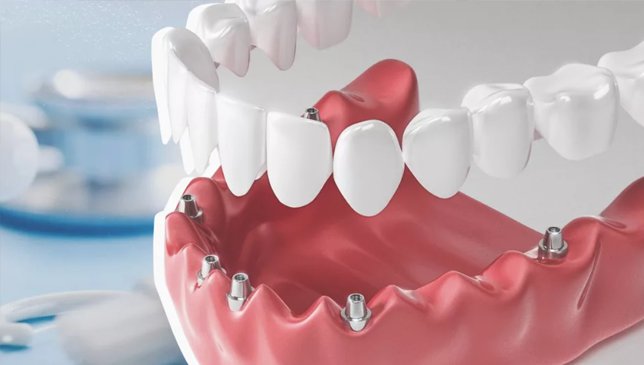Dental implants are one of the most modern and effective solutions for replacing lost teeth. However, implants alone are not enough; the function and aesthetics of missing teeth are completely restored with the prostheses placed on them. Prostheses on implants are divided into two main groups: fixed and removable. Both options are determined according to the needs and clinical condition of the patient. So what are these prosthesis types and in which cases are they preferred? Here are the details:
Fixed Dentures: Natural Tooth Appearance and Comfort
Fixed dentures are permanent prosthetics placed on implants and are not removed by the patient. These prosthetics can be used in different situations from a single tooth to complete toothlessness. In cases where a single tooth is missing, a single crown (covering) is placed on the implant. In cases where more than one tooth is missing, fixed prosthetics in the form of a bridge are preferred. In patients with complete toothlessness, a fixed bridge can be placed on 4 or 6 implants with techniques such as “all-on-4” or “all-on-6”. The biggest advantage of fixed prosthetics is that they offer the closest appearance and function to natural teeth. In addition, they are very comfortable to use since they are not removed by the patient.
Removable Dentures: Economical and Practical Solutions
Removable dentures are prostheses that are placed on implants but can be removed and reattached by the patient. These prostheses are ideal for patients whose bone structure is insufficient for implants or who cannot afford the cost of a fixed prosthesis. Removable dentures can be in the form of “implant-supported palatal dentures” used in completely edentulous patients. These prostheses are placed on implants and provide a more stable and secure use. The biggest advantage of removable dentures is that they are economical and easy to clean. However, they can be less comfortable than fixed dentures and require regular maintenance.
Which Type of Prosthesis is Right for You?
The choice of prosthesis over implants is determined by the patient's clinical condition, budget and expectations. While fixed prostheses offer the closest appearance and function to natural teeth, removable prostheses offer a more economical and practical solution. Your physician will evaluate the condition of your jawbone, the number of implants and prosthesis options and create the most appropriate treatment plan for you. For example, while removable prostheses supported by fewer implants are preferred in patients with insufficient bone structure, fixed prostheses may be recommended in patients with suitable bone structure.
Meet Functional Solutions
Dentures on implants play a major role in restoring missing teeth aesthetically and functionally. While fixed dentures offer the closest appearance and comfort to natural teeth, removable dentures offer a more economical and practical solution. It is important to have a detailed examination and planning with your dentist to determine which type of denture is right for you. With the right denture selection, you can have a healthy and aesthetic smile.
This text is prepared for general information. The appropriate treatment method may vary for each patient and therefore, it is essential to consult with a specialist dentist. Before making any decision regarding dental health, it is very important to have a detailed examination and consultation process with your physician. These articles are for informational purposes only and are not intended to replace professional medical advice.



 by
by